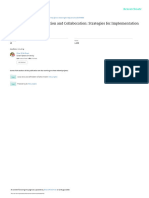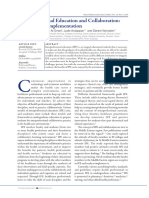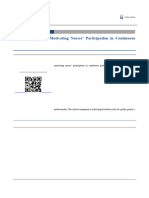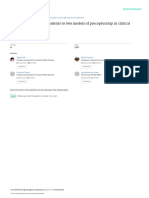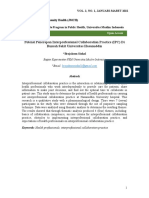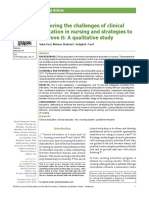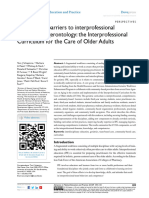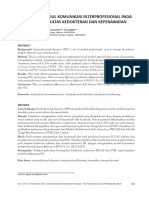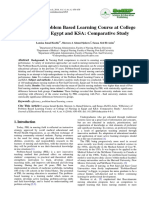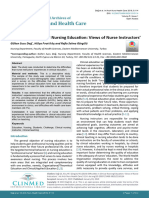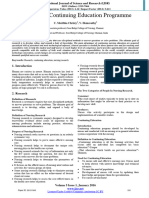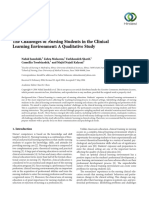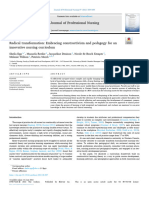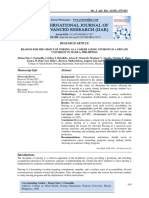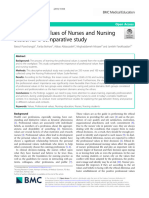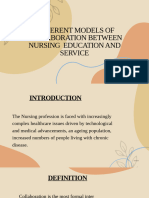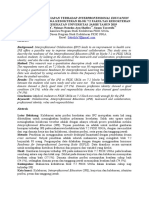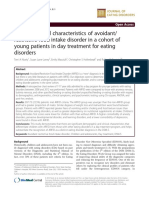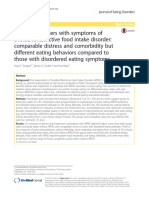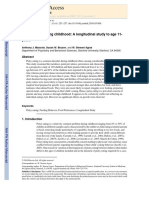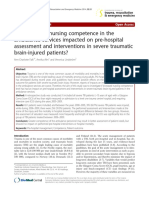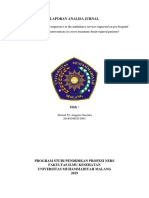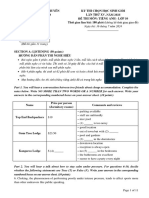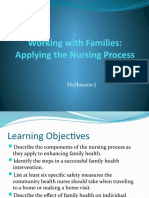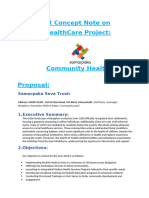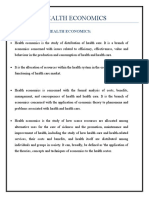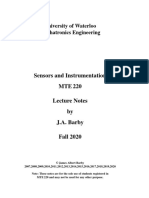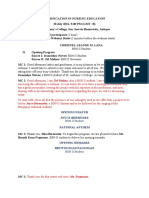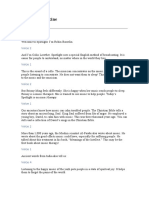Preparing Nursing Students For Interprofessional Learning: June 2014
Preparing Nursing Students For Interprofessional Learning: June 2014
Uploaded by
Ahmad Tri Anggara SasmitaCopyright:
Available Formats
Preparing Nursing Students For Interprofessional Learning: June 2014
Preparing Nursing Students For Interprofessional Learning: June 2014
Uploaded by
Ahmad Tri Anggara SasmitaOriginal Title
Copyright
Available Formats
Share this document
Did you find this document useful?
Is this content inappropriate?
Copyright:
Available Formats
Preparing Nursing Students For Interprofessional Learning: June 2014
Preparing Nursing Students For Interprofessional Learning: June 2014
Uploaded by
Ahmad Tri Anggara SasmitaCopyright:
Available Formats
See discussions, stats, and author profiles for this publication at: https://www.researchgate.
net/publication/269746837
Preparing nursing students for interprofessional learning
Article · June 2014
DOI: 10.5959/eimj.v6i2.238
CITATIONS READS
2 100
7 authors, including:
Jalina Karim Nabishah Mohamad
Hospital Universiti Kebangsaan Malaysia (HUKM) Management and Science University
4 PUBLICATIONS 2 CITATIONS 70 PUBLICATIONS 409 CITATIONS
SEE PROFILE SEE PROFILE
Subhan Mohd Meerah Hamidah Hassan
Universiti Kebangsaan Malaysia KPJ International University College of Nursing and Health Sciences
33 PUBLICATIONS 439 CITATIONS 35 PUBLICATIONS 125 CITATIONS
SEE PROFILE SEE PROFILE
Some of the authors of this publication are also working on these related projects:
he relevance of staff performance evaluation in a pre - existing nursing environment: Everything is New to Everyone View project
Higher Order Thinking Skills View project
All content following this page was uploaded by Nabishah Mohamad on 09 March 2016.
The user has requested enhancement of the downloaded file.
ORIGINAL ARTICLE
Volume 6 Issue 2 2014
DOI: 10.5959/eimj.v6i2.238
www.eduimed.com
Preparing nursing students for interprofessional learning
Jalina Karim1, Nabishah Mohamad1, John H.V. Gilbert2, Ismail Saibon1, Subahan T.Mohd
Meerah3, Hamidah Hassan1, Harlina Halizah Siraj1.,
1
Faculty of Medicine, Universiti Kebangsaan Malaysia, Jalan Yaacob Latif, 56000 Cheras, Kuala Lumpur,
2
College of Health Disciplines, University of British Columbia, 3Faculty of Education, Universiti Kebangsaan,
Bangi, Selangor.
ARTICLE INFO ABSTRACT
Received : 24/10/2013
Accepted : 10/03/2014 Introduction: Teaching strategies for nursing students need to be varied to
Published : 01/06/2014 prepare them for their future practice, and to increase their confidence levels
in order to ensure that they deliver high quality care to patients.
KEYWORD Interprofessional learning (IPL) is a way to develop health professional
Interprofessional learning teams in that it facilitates collaboration by having health professional
Nursing student students learn with, from and about each other’s roles and responsibilities in
Collaboration the provision of patient care. At present, nurses are unable to learn together
Learning process with other health professional students during their clinical posting, because
Student perception of professional barriers. Objective: To explore nursing students’ knowledge
and perception of interprofessional learning. Authors developed a grading
system named the Discrepancy-Agreement. Method: This paper presents
the results of a focus group discussion with nursing students (n= 8). A semi
structured guide was used that focused on knowledge, experiences and
benefit related to IPL. Result: Data were analysed, from which four major
themes emerged: 1) Learning with, from and about other health
professionals; 2) Communication skills; 3) Teamwork; and 4) Preparation
of future practice Conclusion: The results of this study suggest IPL as an
educational strategy should be introduced to nursing students in order to
extend their understanding of the roles and responsibilities of other health
professionals and to provide them with opportunities to work
collaboratively with other health professionals.
© Medical Education Department, School of Medical Sciences, Universiti Sains Malaysia. All rights reserved.
CORRESPONDING AUTHOR: Jalina Karim, MSN, BNSc, SCM, SRN, Department of Nursing, Faculty of
Medicine, University Kebangsaan Malaysia Medical Centre (UKMMC), Jalan Yaacob Latiff, Cheras 54000,
Kuala Lumpur. Email: jalinakarim@hotmail.com
Introduction depends on the motivation and creativity which
are used to enhance the process of students
Education of health professionals should use a learning. As stated in the CAIPE definition: “IPE
variety of appropriate teaching and learning occurs when two or more professions learn with,
strategies in order to help students achieve from and about each other to improve
learning outcomes that include appropriate collaboration and the quality of care” (2, 3).
knowledge, psychomotor skills, and professional
attitudes (1). A variety of teaching strategies will IPL is now an essential part of health
prepare students to practice successfully in real professional education and has been introduced
working environment. The quality of learning in many countries (3). In order to deliver
Education in Medicine Journal (ISSN 2180-1932) © www.eduimed.com | e27
effective health care services, interprofessional thereby providing rich data (13). Our focus
collaboration should be introduced to students group comprised eight third year nursing
during their pre-registration/licensure studies (5, students at UKMMC. The intention of the focus
6) which will prepare them to work group was to gather as many responses from the
collaboratively after they graduate (3). IPL is a participants, as possible (14). A semi- structured
way to facilitate collaboration among health guide was used during the session, which
professional teams, and will help nursing focused on: 1) the knowledge, experiences and
students learn with, from and about other health benefit that could be learned together, and 2) the
professionals, to achieve this goal. possible timing of IPL during pre-
registration/licensing years. Discussions lasted
IPL addresses various factors that are common in between 45 minutes and one hour. Data captured
practice, such as, team based patient care and the narrative voices from participants during the
collaborative practice (6). It is inappropriate for session. Prior ethical approval was obtained from
members of a health care team to work the institutional ethical committee. Information
independently if their goal is high quality care. It sheets were provided and informed consent
is therefore a necessary that each team member obtained prior to focus group discussion.
learns to work together in order to achieve Participants were assured of confidentiality.
patient oriented goals (7,8). To ensure nursing
students collaborate with other health Method of Analysis
professionals, they must be provided with active Using thematic analysis focus group discussions
educational and learning opportunities to were analysed manually, in four stages:
improve their understanding of other health 1. Transcription of the discussion was carried
professionals (9). out by the researcher. Transcribing
familiarized her with the entire text of the
Currently, nursing students are taught to focus on focus group discussions.
their specific professional roles (10) and are 2. Following familiarization with the texts, the
unable to learn together during their clinical researcher carefully read the transcriptions,
training due to professional boundaries imposed, line by line, and performed content analysis
for example, by scopes of practice, regulation . The content analysis described what she
and accreditation. There is a clear need to make had interpreted in the texts.
innovations in teaching, especially during 3. The content analyses were then grouped
clinical training, in order to prepare future nurses together into themes.
for collaborative practice with other health 4. Four major themes were derived from this
professionals (11). grouping. The major themes best describe
nursing students’ knowledge and perception
The objective of this study was to identify the of IPL. Texts were shared with a colleague
readiness for IPL among nursing students, with to check for accuracy of transcription.
the ultimate aim of providing useful information
for curriculum change, and development. Results
Method Data were analysed and yielded the following
four themes about knowledge and perception of
We conducted this study using focus group IPL:
discussions. According to Lapan (12), a focus Learning with, from and about other
group is an interview with multiple informants health professionals,
(five to ten participants) the aim of which is to Communication skills,
gather in depth information about specific topics Teamwork,
set out in a series of focused questions. During Future preparation.
discussion, participants are able to share their
ideas and understanding on the topic discussed,
Education in Medicine Journal (ISSN 2180-1932) © www.eduimed.com | e28
Learning with, from and about other health Teamwork
professionals was agreed on by a majority of Teamwork was another important issue agreed
participants. One commented: on by a majority of the participants ‘We need to
have teamwork with students from other
‘I agree that we should learn together with other professionals’. One commented that ‘we need the
professions… for example, we should learn skills teamwork in order to deliver a quality of care to
on suction to the patient together with the patient.’ (Student 4)
physiotherapy students… so that we can share
information etc.’ (Student 1) The future preparation
Participants made some specific suggestions
Another student, concerning future preparation as a strategy that
could help to develop IPL. For example,
‘… we can learn together, we would not feel 1. An issue raised by a number of participants
awkward to share ideas, therefore, there is no related to the number of students per group.
gap with the medical students.’ (Student 2) The hope was expressed that the number of
participants in a group should not be too
‘No overlap roles because everybody can large, and that there should be equality
participate and knows their roles during the between the numbers of students from each
patient managemen.t’ (Student 3) profession.
2. There was concern that IPL should not be
‘We can learn through this experience, it can dominated by certain program. ‘Need to
prepare us to work together in the have an equal chance to other professions
future.’(Student 8) involved, therefore, we can discuss the
patient management easily.’ (Student 7)
The students tried to defend their roles as did 3. Equality was raised by some of the
mention by one of them, ‘We can learn together, participants, especially in terms of
however, some of the professions still thinking assessment; ‘have to make sure that if an
that we have to follow orders and no autonomy assessment is needed, the students from
during patient management.’ (Student 3) other professions have to do the same, so
that everybody has to be responsible.’
Communication skills (Student 3)
Most participants mentioned that communication 4. A majority of focus group participants were
with other professions is important; however, favourably inclined to having topics
they were not given a chance to communicate discussed that related to their clinical
during patient management, as illustrate by the training in order for them to practice in
comment of one participant; delivering a quality care to patients; ‘the
topic must relate to clinical placement’.
‘At the moment we are not taught to 5. Some individuals mentioned that there was
communicate with other professions, it depends a, ‘Need (for) a trained facilitator in the
on our own initiative...’(Student 4) learning session and from other health
professional disciplines.’ (Student 4 and 5)
As indicated above, most of the health 6. A majority of discussants agreed on
professional education takes place within their exposure early to IPL. One participant said:
programmes and the curricula did not emphasize ‘It is good to expose us early to other
on interaction with other health care professions professions, therefore, we will understand
(15) . better about other professions’. In contrast,
there was one participant disagreed that the
One participant emphasized that; ‘At last patient students should be exposed as early as year
will suffer from the miscommunication between one, as she mentioned that ‘each students
the team.’ (Student 3) must be exposed to their own profession, get
Education in Medicine Journal (ISSN 2180-1932) © www.eduimed.com | e29
to know their profession before they can that IPL should be accurately assessed since it is
contribute to others.’ (Student 3) known that objective and fair assessment
motivates students to learn (7).
Discussion
From discussion in the focus groups, it was clear
The objective of this study was to identify the that there is a need for experienced facilitators to
readiness for IPL among nursing students, with facilitate IPL. Experienced and committed
the ultimate aim of providing useful information facilitators are required to be involved in IPL (7)
for curriculum change, and perception of from different disciplines (16,20). Facilitators
interprofessional learning. who are poorly prepared and unable to become a
good role models will clearly interfere with the
Nursing students appear positive and ready for success of the IPL (17).
IPL (4,15). Understanding of their own, and
other health professionals’ roles in managing The number of students and equal representation
patient care increased after students had been across programs are seen as important factors for
exposed to IPL (5). Furthermore, uniprofessional the success of IPL and both were mentioned by a
care is seen as not being as of high quality as that majority of students. IPL requires a small
provided by interprofessional teams. (8, 14). learning group (7) between 5-10 students
(22).The number of students from each
There are only a few opportunities to expose profession must be equal in order to experience
students so that they understand each other roles good interprofessional interactions (19) and
(15) and are able to collaborate with other health avoid domination by a large professional group
professionals (7). The opportunity to learn (7) .
together can break down negative feeling
towards other health professionals (17). In IPL is very challenging (20), it is a hard goal to
addition, IPL is seen to improve communication achieve (22) and needs to be very carefully
skills , professional interdependence and planned in order to avoid frictions(19) and
confidence levels (16). interprofessional conflict (7). Faculty members
play an important role in supporting IPL as role
We also found that the majority of students in models. (19). Positive learning environments,
this study perceived that it is good to expose which encourage socialization, should be
them early to IPL. Based on findings by Priest supported as students will then give their full
and Robert (18), it is essential to expose commitment to IPL (17). There will be
students early in order that they become effective challenges in designing and implementing the
collaborative team members. Early exposure is IPE (15). Good planning, designing and
seen as encouraging the development of positive preparation for the difficulties that could arise
attitudes and behaviours (19). However, it is also (18) such as scheduling, number of students and
possible that it is not good to expose students to accountability (22) will end with the success(7).
IPL too early since they may not yet be familiar Changing and developing curriculum that
with their own professional roles which might facilitates IPL is known to ensure that high
negatively impact their contribution to team quality patient care is the outcome of health
learning (7,20). professional education.
Steinert (17) argued that early exposure to IPL Conclusion
can give students chance to actively participate
in collaborative patient care and therefore In this study, responses of focus group
develop positive attitudes to working together participants showed that IPL is perceived as
with other health professionals at an early stage positive in terms of interest, acceptance and
in their education (7). In addition, the discussants understanding. This study also showed that
highlighted issues such as assessment. It is clear nursing students are ready for a curriculum that
Education in Medicine Journal (ISSN 2180-1932) © www.eduimed.com | e30
embraces IPL. This idea has significant potential 7. Begley CM. Developing inter-professional
for the future of nursing education. It is learning: tactics, teamwork and talk. Nurse
suggested that IPL can be introduced and Educ Today; 2009 Apr;29(3):276–83.
implement and it is an opportunity for nursing 8. Reeves, S., Lewin, S., Espin, S., Zwarenstein
students to learn how to work collaboratively M. Promoting Partnership for health.
with other health professionals. Giving these Interprofessional Teamwork for Health and
findings, there is a clear need to examine best social care. Wiley-Blackwell.UK; 2010.
methods for introducing IPL into nursing 9. Rothgeb MK. Creating a nursing simulation
curriculum. The suggestions and opinions of laboratory: a literature review. J Nurs Educ.
focus group discussants with respect to preparing 2008 Nov;47(11):489–94.
a future IPL module are viewed as positive in 10. Lumague M, Morgan A, Mak D, Hanna M,
assisting curriculum development. Findings from Kwong J, Cameron C, et al. Interprofessional
this study will support those responsible for the education: the student perspective. J Interprof
development of nursing curricula to include Care. 2006 Jun;20(3):246–53.
interprofessional learning and collaborative 11. Cody WK. Interdisciplinarity and Nursing:
practice as a goal to high quality and safe patient “Everything is Everything,” or Is It? Nurs Sci
care. Q. 2001 Oct 1;14(4):274–80.
12.Lapan SD, Quartaroli MT. Qualitative
Reference Research An Introduction to Methods and
Designs. Riemer FJ, editor. Jossey-Bass;
1. Nabishah M. Cabaran Pendidikan Perubatan 2012.
abad ke 21. Universiti Kebangsaan Malaysia; 13. Goodman C, Evans C. Using Focus Groups.
2011. In: Gerrish K, Lacey A, editors. The research
2. CAIPE. Centre for the Advancement of process in nursing. UK: Blackwell
Interprofessional Education [Internet]. 2002. Publishing; 2006. p. 550.
Available from: 14.Stewart, D.W., Shamsadani, P.N., Rook. DW.
http://www.caipe.org.uk/resources/defining- Focus groups theory and practice. 2nd ed.
ipe/ Sage publication.USA.; 2007.
3. Coster S, Norman I, Murrells T, Kitchen S, 15. Barnsteiner JH, Disch JM, Hall L, Mayer D,
Meerabeau E, Sooboodoo E, et al. Moore SM. Promoting interprofessional
Interprofessional attitudes amongst education. Nurs Outlook. 2007;55(3):144–50.
undergraduate students in the health 16.Street KN, Eaton N, Clarke B, Ellis M,
professions: a longitudinal questionnaire Young PM, Hunt L, et al. Child disability
survey. Int J Nurs Stud. 2008 case studies: an interprofessional learning
Nov;45(11):1667–81. opportunity for medical students and
4. D’Amour D, Ferrada-Videla M, San Martin paediatric nursing students. Med Educ. 2007
Rodriguez L, Beaulieu M-D. The conceptual Aug;41(8):771–80.
basis for interprofessional collaboration: core 17. Steinert Y. Learning together to teach
concepts and theoretical frameworks. J together: interprofessional education and
Interprof Care. 2005 May;19 Suppl faculty development. J Interprof Care. 2005
1(May):116–31. May;19 Suppl 1(May):60–75.
5. Hylin U, Lonka K, Ponzer S. Students ’ 18.Priest, H.M., Robert, P. DH. Interprofessional
approaches to learning in clinical education and working in mental health: in
interprofessional context. Med Teach. search of the evidence based. J Nurs Manag.
2011;33:e204–e210. 2008;16(4):474–85.
6. Sargeant J. Theories to Aid Understanding 19.Oandasan I, Reeves S. Key elements for
and Implementation of Interprofessional interprofessional education. Part 1: the
Education. J Contin Educ Health Prof. learner, the educator and the learning context.
2009;29(3):178–84. J Interprof Care. 2005 May;19 Suppl
1(May):21–38.
Education in Medicine Journal (ISSN 2180-1932) © www.eduimed.com | e31
20. Ker J, Mole L, Bradley P. Early introduction
to interprofessional learning: a simulated
ward environment. Med Educ. 2003
Mar;37(3):248–55.
21. Hammick M, Freeth D, Koppel I, Reeves S,
Barr H. A best evidence systematic review of
interprofessional education: BEME Guide no.
9. Med Teach. 2007 Oct;29(8):735–51.
22. Freeth D, Nicol M. Learning clinical skills:
an interprofessional approach. Nurse Educ
Today. 1998 Aug;18(6):455–61.
Appendix
Semi structured questionnaire
1. How far do you feel your achievement in the
learning process?
2. Have you ever heard about Interprofessional
Learning (IPL)?
3. Do you know about IPL in general or our
faculty?
4. Do IPL been practicing in our faculty?
5. What are the advantages of IPL that you
know?
5. If there will be a new learning package that
involves the IPL, what do you aspect from this
learning package?
Education in Medicine Journal (ISSN 2180-1932) © www.eduimed.com | e32
View publication stats
You might also like
- Ceftriaxone Drug StudyDocument1 pageCeftriaxone Drug StudyEmjae Colmenares0% (1)
- Natural Anti Viral Self Defense StevenWmFowkesDocument251 pagesNatural Anti Viral Self Defense StevenWmFowkesChristopher Phillips100% (1)
- Interprofessional Educationand CollaborationDocument7 pagesInterprofessional Educationand CollaborationnersrosdianaNo ratings yet
- Interprofessional Education - The Way Forward in Health ProfessionDocument2 pagesInterprofessional Education - The Way Forward in Health ProfessionJLatriece Elizabeth CedeñoNo ratings yet
- Rw-Omj-D-18-00175 (05C)Document6 pagesRw-Omj-D-18-00175 (05C)nersrosdianaNo ratings yet
- Self-Regulated Learning of Nursing Students A CrosDocument14 pagesSelf-Regulated Learning of Nursing Students A CrosNathaniel BudayNo ratings yet
- Keele FrameworkDocument6 pagesKeele FrameworkNoreen PunjwaniNo ratings yet
- Medical Education - 2005 - McNairDocument9 pagesMedical Education - 2005 - McNairISABEL BUENO SANTOS MENEZESNo ratings yet
- Ijhms.3.30003 2mappingcareerDocument9 pagesIjhms.3.30003 2mappingcareermiraNo ratings yet
- Educationalinterventiontoimprove GoodDocument8 pagesEducationalinterventiontoimprove Gooderine5995No ratings yet
- Evaluation of Internship Assessment in Medical ColDocument5 pagesEvaluation of Internship Assessment in Medical ColawesomeNo ratings yet
- Continuing Education: Concepts and Strategies: Indian Pediatrics June 1995Document8 pagesContinuing Education: Concepts and Strategies: Indian Pediatrics June 1995SHABRINA WIDAD NAZIHAH 2021No ratings yet
- International Journal of Nursing SciencesDocument5 pagesInternational Journal of Nursing SciencesWahyu Phaling FienterNo ratings yet
- Factoras influencing CPDDocument5 pagesFactoras influencing CPDcollin sriyanthaNo ratings yet
- Career Development of Nursing Preceptors in Iran A Descriptive StudyDocument5 pagesCareer Development of Nursing Preceptors in Iran A Descriptive StudyWisda viaNo ratings yet
- Joma3 1Document6 pagesJoma3 1Faisal AzmiNo ratings yet
- perceptionofnursingstudentstotwomodelsofperceptorshipinclinicaltraining - لعمل نفس الدراسةDocument7 pagesperceptionofnursingstudentstotwomodelsofperceptorshipinclinicaltraining - لعمل نفس الدراسةSamah IshtiehNo ratings yet
- Peer To PeerDocument7 pagesPeer To PeerChandra Hidayat RcrNo ratings yet
- Challenges Before Nursing Educators An OverviewDocument2 pagesChallenges Before Nursing Educators An OverviewEditor IJTSRDNo ratings yet
- 484-Article Text-2064-1-10-20210507Document8 pages484-Article Text-2064-1-10-20210507QOMARIYATUL ULYAHNo ratings yet
- Exploring The Challenges of Clinical EducationDocument8 pagesExploring The Challenges of Clinical EducationVlarah Alondra LiponNo ratings yet
- Jcen Oar MadhavanprabhakaranDocument8 pagesJcen Oar MadhavanprabhakaranSamah IshtiehNo ratings yet
- Overcoming BarriersDocument10 pagesOvercoming Barriersanidem-No ratings yet
- 2019 Article 1560Document7 pages2019 Article 1560Karylle Ezra GulifardoNo ratings yet
- Efektivitas Modul Komunikasi Interprofesional Pada Mahasiswa Fakultas Kedokteran Dan KeperawatanDocument8 pagesEfektivitas Modul Komunikasi Interprofesional Pada Mahasiswa Fakultas Kedokteran Dan Keperawatanmonaliza jessieNo ratings yet
- Shadow ANurseDocument8 pagesShadow ANurseSculpting FutureNo ratings yet
- Education 4 6 3 PDFDocument9 pagesEducation 4 6 3 PDFYanny LabokNo ratings yet
- Practice Makes Perfect The Learner Doctor.2Document4 pagesPractice Makes Perfect The Learner Doctor.2rafaeliluis79No ratings yet
- international-archives-of-nursing-and-health-care-ianhc-5-114Document9 pagesinternational-archives-of-nursing-and-health-care-ianhc-5-114mortilla.gileanne.jof15No ratings yet
- Simulation in Healthcare Education: A Best Evidence Practical Guide. AMEE Guide No. 82Document21 pagesSimulation in Healthcare Education: A Best Evidence Practical Guide. AMEE Guide No. 82Raneem FathyNo ratings yet
- Research in Continuing Education Programme: C. Meribha Christy, V. HemavathyDocument4 pagesResearch in Continuing Education Programme: C. Meribha Christy, V. HemavathyRubina MasihNo ratings yet
- Article 2 (Teamwork) MGT648 PDFDocument9 pagesArticle 2 (Teamwork) MGT648 PDFNatasya ShaNo ratings yet
- Research in Social and Administrative Pharmacy 16 (2020) 25-32Document8 pagesResearch in Social and Administrative Pharmacy 16 (2020) 25-32School StuffNo ratings yet
- Transfer of Learning Using Simulation Based Education Among Students of Teaching InstitutionsDocument5 pagesTransfer of Learning Using Simulation Based Education Among Students of Teaching InstitutionsEditor IJTSRDNo ratings yet
- Development of A Systematic Career Coaching PrograDocument10 pagesDevelopment of A Systematic Career Coaching PrograCamille de La CruzNo ratings yet
- Research Article: The Challenges of Nursing Students in The Clinical Learning Environment: A Qualitative StudyDocument8 pagesResearch Article: The Challenges of Nursing Students in The Clinical Learning Environment: A Qualitative StudyBreezy ReveloNo ratings yet
- Healthcare 11 00545Document11 pagesHealthcare 11 00545Dina TrisnawatiNo ratings yet
- Slides For DFFNT Models of CollaboratnDocument43 pagesSlides For DFFNT Models of CollaboratnRebizz BizzNo ratings yet
- 58 Iajps58122017 PDFDocument5 pages58 Iajps58122017 PDFBaru Chandrasekhar RaoNo ratings yet
- Interprofessional EducationDocument12 pagesInterprofessional EducationAida TantriNo ratings yet
- SJMPS - 38896 906 1Document11 pagesSJMPS - 38896 906 1danicaattabanNo ratings yet
- Curriculum Development in Nursing Education. Where Is The Pathway?Document7 pagesCurriculum Development in Nursing Education. Where Is The Pathway?Ajay DNo ratings yet
- Faculty Development CPDDocument6 pagesFaculty Development CPDAida TantriNo ratings yet
- Interprofesional Education (IPE) Meningkatkan Kemampuan KomunikasiDocument13 pagesInterprofesional Education (IPE) Meningkatkan Kemampuan KomunikasiNur Ainaa Almardhiyah TubungNo ratings yet
- Impact of An Interprofessional PopulatioDocument4 pagesImpact of An Interprofessional Populatiorafaeliluis79No ratings yet
- Problem Based Learning PBL A Novel and Effective TDocument9 pagesProblem Based Learning PBL A Novel and Effective TJhon Patrick NaldaNo ratings yet
- Research in Continuing EducationDocument25 pagesResearch in Continuing EducationArchana Verma100% (1)
- Embracing Constructivism and Pedagogy For An Innovative Nursing CurriculumDocument6 pagesEmbracing Constructivism and Pedagogy For An Innovative Nursing CurriculumStephanie StarletNo ratings yet
- Tutoría Entre Iguales en Una Escuela de Medicina Percepciones de Tutores y TutoradosDocument7 pagesTutoría Entre Iguales en Una Escuela de Medicina Percepciones de Tutores y TutoradosFalconSerfinNo ratings yet
- Reasons For The Choice of Nursing As A Career Among Students in A Private University in Manila, PhilippinesDocument5 pagesReasons For The Choice of Nursing As A Career Among Students in A Private University in Manila, PhilippinesIJAR JOURNALNo ratings yet
- A Guide to Medical Teaching and Learning Training of the Trainers (Tot): In the View of the Learner-Centered Learning ModelFrom EverandA Guide to Medical Teaching and Learning Training of the Trainers (Tot): In the View of the Learner-Centered Learning ModelNo ratings yet
- Paper Adulto MayorDocument6 pagesPaper Adulto MayorIgnacio Ibarra TorresNo ratings yet
- The Importance of Professional Values From Nursing Students ' PerspectiveDocument7 pagesThe Importance of Professional Values From Nursing Students ' Perspectivecarolinamustapha0No ratings yet
- Development and Experimental Results of Outcomes-Based Nursing ProgramDocument6 pagesDevelopment and Experimental Results of Outcomes-Based Nursing ProgramIJAR JOURNALNo ratings yet
- Model Pendidikan Interprofesional Dalam 5487b47c PDFDocument11 pagesModel Pendidikan Interprofesional Dalam 5487b47c PDFNabila PamardikaNo ratings yet
- IPEM NotesDocument28 pagesIPEM NotesJelcy MangulabnanNo ratings yet
- Professional Values of Nurses and Nursing Students: A Comparative StudyDocument7 pagesProfessional Values of Nurses and Nursing Students: A Comparative Studyjinsi georgeNo ratings yet
- Facilitating Community Based InterprofesDocument4 pagesFacilitating Community Based Interprofesrafaeliluis79No ratings yet
- AMEE Guide 169 Interprofessional Learning in Practice-Based SettingsDocument14 pagesAMEE Guide 169 Interprofessional Learning in Practice-Based SettingsMalak ShaheenNo ratings yet
- different model of collaboration ppt NEDocument29 pagesdifferent model of collaboration ppt NEmissnaira5No ratings yet
- Naskah Publikasi FixDocument14 pagesNaskah Publikasi FixSabet LilyNo ratings yet
- Medical Education in Pulmonary, Critical Care, and Sleep Medicine: Advanced Concepts and StrategiesFrom EverandMedical Education in Pulmonary, Critical Care, and Sleep Medicine: Advanced Concepts and StrategiesPatricia A. KritekNo ratings yet
- Nutrients: Youth With Avoidant Disorder: Examining Di Status, and Symptom DurationDocument12 pagesNutrients: Youth With Avoidant Disorder: Examining Di Status, and Symptom DurationAhmad Tri Anggara SasmitaNo ratings yet
- Prevalence and Characteristics of Avoidant/ Restrictive Food Intake Disorder in A Cohort of Young Patients in Day Treatment For Eating DisordersDocument8 pagesPrevalence and Characteristics of Avoidant/ Restrictive Food Intake Disorder in A Cohort of Young Patients in Day Treatment For Eating DisordersAhmad Tri Anggara SasmitaNo ratings yet
- 2016 Article 110Document11 pages2016 Article 110Ahmad Tri Anggara SasmitaNo ratings yet
- HHS Public Access: Cognitive-Behavioral Treatment of Avoidant/Restrictive Food Intake DisorderDocument11 pagesHHS Public Access: Cognitive-Behavioral Treatment of Avoidant/Restrictive Food Intake DisorderAhmad Tri Anggara SasmitaNo ratings yet
- NIH Public Access: Author ManuscriptDocument12 pagesNIH Public Access: Author ManuscriptAhmad Tri Anggara SasmitaNo ratings yet
- Teamwork and Collaboration in Healthcare: Elements of Inter-Professional TeamworkDocument6 pagesTeamwork and Collaboration in Healthcare: Elements of Inter-Professional TeamworkAhmad Tri Anggara SasmitaNo ratings yet
- The Answer Is Readiness Now What Is The Question?: Early Education and Development January 2006Document2 pagesThe Answer Is Readiness Now What Is The Question?: Early Education and Development January 2006Ahmad Tri Anggara SasmitaNo ratings yet
- Motivation Concept Theories and PracticaDocument8 pagesMotivation Concept Theories and PracticaAhmad Tri Anggara SasmitaNo ratings yet
- Art 10.1186 - 1757 7241 22 20Document5 pagesArt 10.1186 - 1757 7241 22 20Ahmad Tri Anggara SasmitaNo ratings yet
- Jurnal OsteoartritisDocument14 pagesJurnal OsteoartritisAhmad Tri Anggara SasmitaNo ratings yet
- Cover JurnalDocument1 pageCover JurnalAhmad Tri Anggara SasmitaNo ratings yet
- Thesis On AnatomyDocument11 pagesThesis On Anatomyntphuc365No ratings yet
- Graduate College Newsletter Issue 12 PDFDocument16 pagesGraduate College Newsletter Issue 12 PDFKritika GumberNo ratings yet
- Female Genital Mutilation ConsDocument18 pagesFemale Genital Mutilation Consfitri annisanmNo ratings yet
- Order 7548703 - Health, Wellbeing and InequalityDocument10 pagesOrder 7548703 - Health, Wellbeing and Inequalitybrayen muchiriNo ratings yet
- Working With Families: Applying The Nursing Process: DR - Hussein JDocument23 pagesWorking With Families: Applying The Nursing Process: DR - Hussein JAli FalihNo ratings yet
- Global CBTS Certified Manager CAPSI ISIO Trainer Assessor Guide For Biological Threat CertificateDocument30 pagesGlobal CBTS Certified Manager CAPSI ISIO Trainer Assessor Guide For Biological Threat CertificateMarius BuysNo ratings yet
- Bhatia's Battery of Personality Test of IntelligenceDocument17 pagesBhatia's Battery of Personality Test of IntelligenceTanisha Vyas100% (1)
- Pravesh Niti 2023-24Document39 pagesPravesh Niti 2023-24thelaksh890No ratings yet
- Levels of Financial Stress FinalDocument16 pagesLevels of Financial Stress FinalSuratos MarioNo ratings yet
- Ambulance Project ProposalDocument3 pagesAmbulance Project Proposaljerryandrews891No ratings yet
- Issues and Management of Transgender Community in Pakistan A Case Study of LahoreDocument11 pagesIssues and Management of Transgender Community in Pakistan A Case Study of Lahoreanhum jadoonNo ratings yet
- Definitions of Health EconomicsDocument10 pagesDefinitions of Health EconomicsSree LathaNo ratings yet
- Udvartana (Massage Therapy) : Dr. Ritu Wadhwa, M.D. KayachikitsaDocument4 pagesUdvartana (Massage Therapy) : Dr. Ritu Wadhwa, M.D. KayachikitsaAvinashNo ratings yet
- MTE 220 Course - NotesDocument163 pagesMTE 220 Course - NotesqNo ratings yet
- Jurnal Jiwa 3Document13 pagesJurnal Jiwa 3Bella FebriantiNo ratings yet
- Technical Script NCM 110Document4 pagesTechnical Script NCM 110CA Candido JavierNo ratings yet
- Pre-Test (With Answers) : Section I: KnowledgeDocument7 pagesPre-Test (With Answers) : Section I: KnowledgeIsabel Castillo100% (2)
- Mrs. Rency SajiDocument150 pagesMrs. Rency SajiAakanksha GeorgeNo ratings yet
- Tuberculosis Nursing Care Plan Ineffective Airway Clearance PDFDocument2 pagesTuberculosis Nursing Care Plan Ineffective Airway Clearance PDFPratiksha AmbedkarNo ratings yet
- Spearman (Protected Party by His Brother and Litigation Friend, Spearman) V Royal United Bath Hospitals NHS Foundation Trust (2017) EWHC 3027 (QB)Document30 pagesSpearman (Protected Party by His Brother and Litigation Friend, Spearman) V Royal United Bath Hospitals NHS Foundation Trust (2017) EWHC 3027 (QB)m-6150975No ratings yet
- WWW - Myhealthrecord.Gov - Au/: Mygov Health Records - GoogleDocument5 pagesWWW - Myhealthrecord.Gov - Au/: Mygov Health Records - GoogleJoevan PonceNo ratings yet
- Challenges, Supports, and Postpartum Mental Health Symptoms Among Non-Breastfeeding MothersDocument10 pagesChallenges, Supports, and Postpartum Mental Health Symptoms Among Non-Breastfeeding MothersKarinaNo ratings yet
- Awfpc 2022Document7 pagesAwfpc 2022Jay-p BayonaNo ratings yet
- Posttraumatic Cognitions Inventory (PTCI)Document2 pagesPosttraumatic Cognitions Inventory (PTCI)Jessica KruminsNo ratings yet
- Influence of Dental Implant/mini Implant Design On Stress Distribution in Overdentures: A Systematic ReviewDocument13 pagesInfluence of Dental Implant/mini Implant Design On Stress Distribution in Overdentures: A Systematic ReviewDANTE DELEGUERYNo ratings yet
- Perdev Chapter 1Document35 pagesPerdev Chapter 1Donita BinayNo ratings yet
- Efektivitas Health Promotion Terhadap Upaya Pencegahan Kekambuhan Dan Kontrol AsmaDocument4 pagesEfektivitas Health Promotion Terhadap Upaya Pencegahan Kekambuhan Dan Kontrol AsmaAkbar ZhagtrisNo ratings yet
- Music As MedicineDocument4 pagesMusic As MedicineJuan Carlos PASQUEL G.No ratings yet


